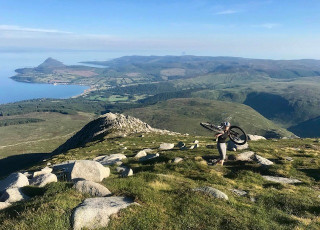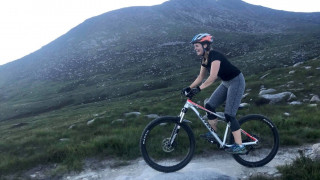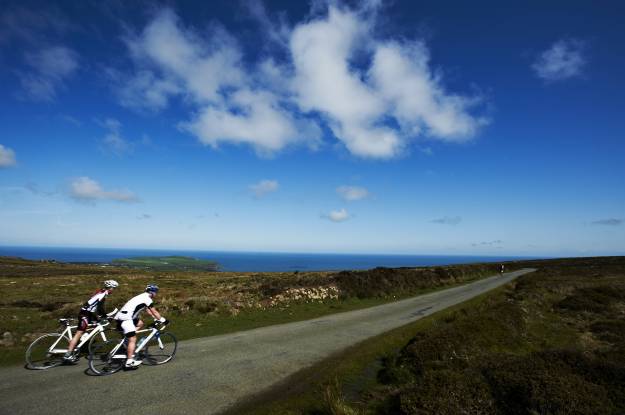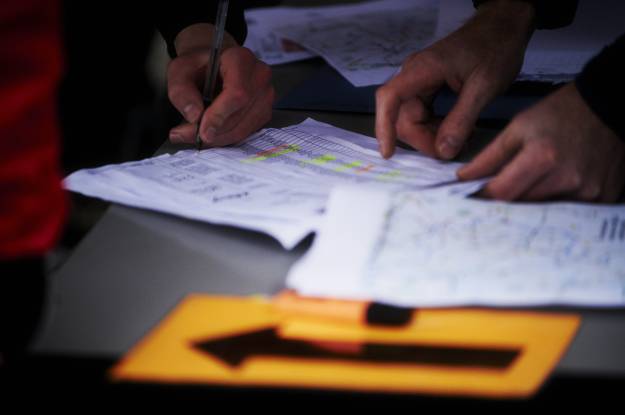18 - 24 May 2020 is Mental Health Awareness Week and at Scottish Cycling we are exploring how cycling supports mental health. Youth Panel member Eilidh explains what it means to her.
"Safe to say, times are a bit surreal. We are all currently shut away from society in a spiral of Netflix, zoom meetings and baking copious amounts of banana bread. The world in isolation.
‘Isolation’ the word itself suggests loneliness, disconnection and dissociation. The isolation can be a catalyst to the stress and anxiety we are all feeling. The overwhelming amount of information from every media source possible is hard to escape. The worries we feel for the health and financial state of our loved ones and our country as a whole. Time melts away and then we are back to Thursday again and everyone is out clapping. Our country has made amazing efforts, from our overtime key workers to those simply doing their bit by staying home and binging Game of Thrones again. It does not distract from the uncertainty and fear we have for the future. We know that we will make it through this together. It is taking its toll however and the mental health of our locked down population must be a priority. Exercise is one method to combat the stress and unease we feel, during lockdown.
Just like any other organ the brain can become ill or distressed. The unpredictable and catastrophic nature of recent events can contribute to a negative mental state.
Mental Health UK charity states that it is “completely normal” to be “feeling anxious or stressed during this time”. Sleeplessness, irritability, loss of eating habits and lack of motivation are side effects of the stress that many, including myself, are experiencing. Everyone is missing out on plans, missing family, missing friends, even missing work and school. I just left school, the abrupt end to my final year has set me and my classmates on an unsteady course to our future. Summer employment, 18th birthday parties and the hope of a driving licence has been put on ice. The precariousness of our futures post high school is unsettling. However, it is important to keep perspective, as there are many who have lost much more.
Everyone has a story, a plan or a hope that Covid has dismantled. This can leave us without a clear path and without anything to look forward to.
Professor Ed. Bullmore, Department of Psychiatry Head, Cambridge University, said “The pandemic is clearly having a major social and psychological impact... increasing unemployment, separating families and various other changes”. He highlights that these are “risk factors for anxiety, depression and self-harm,”. Phillipa Roxby, BBC health reporter stresses that “people with existing mental-health issues” are “vulnerable” due to “disruption to services and relapses”. Now, more than ever, it is essential to take care of your mental health, specifically those with pre-existing conditions. Bullmore emphasises that in a health crisis “we need to keep thinking about mental and physical health together and not apart,”. Mental and physical health comes hand in hand. To treat mental problems the same as you would if they were physical. Maintaining your physical health in turn benefits your mental health.
We all know what exercise does physically but how can it help mentally?
Honestly, I feel exercise is the most important thing that is getting me through isolation. Mental health is a labyrinth which is specific to each individual - sport creates a place to escape and expresses your emotions, even for 10 minutes. The British Medical Journal states that “Exercising for one to two hours every week reduces the risk of developing depression by 44%”. Writers from HelpGuide comment that “exercise can help… break out of the cycle of negative thoughts that feed depression.” Exercise creates an endorphin powered high to elevate mood, self-esteem and attention. I find on days when I have exercised, I am able to be productive and manage my stress.
You do not have to be a competitive athlete or a fitness devotee to reap the benefits. At the moment doing exercise is practically free, no gym fees, transport costs etc… There is no price tag on a walk not to mention all the free workout videos online.
Something I have been struggling with in isolation is my sleep hygiene. It is something I haven't experienced much before. Mental health charity Mind links exercise to “better sleep” as you are simply “more tired at the end of the day”. Having a healthy sleep pattern is crucial, as it encourages a sense of structure and consistency. During lockdown I have seen the drastic effects of exercise on my mental health, specifically its improvement on my sleep. No matter your age or ability exercise is key in improving your mental state.

It can't all be that easy? Exercise and all your problems will disappear. Well it's not. I understand there are challenges and barriers when it comes to exercise, especially now. We are all living a more sedentary lifestyle, so exercise we wouldn't have even accounted for we are not getting.
It’s not as easy or as sociable as it used to be, no quick trip to the gym, no team sports, no clubs no fitness classes. The NHS suggests to “workout with a friend or family member”, even if you can’t in person, phone a friend and do it via call. If you're like me and binging endless amounts of Netflix, do a short exercise routine as you watch. Location is a factor. I live on the Isle of Arran, a rural community known for its scenic views and walks. I am lucky to be able to get outside and run and cycle much the same as I used to - it is much harder for many. The main thing is to be adaptable and make the most of getting outside.
There are days I struggle not to hit the snooze button 12 times, let alone get out and exercise! When you feel exhausted and overwhelmed exercise may be the last thing on your mind, some days I even feel it will make me worse.
Marion Webb, a certified personal trainer and experienced sportswoman emphasizes that even a small amount of exercise can “increase in energy levels” and make you feel “less fatigued”. The truth is, she is right but sometimes motivation still is lacking. There is such a variety in types of exercise that everyone is bound to find one they enjoy. Try new exercises to keep things fun and avoid tedium. I set myself small goals - short term and long term - it allows me to have something to work towards and challenge myself with. Having a pet (or even a younger sibling who has just been in the house too long), can be a motivation to get moving. It doesn't have to be anything excessive, just a little every day. Something as simple as mowing the grass or dancing around your kitchen. So long as you break a little sweat, get your heart rate up and get moving.
Sport and physical activity have been my anchor in all that is going on. It keeps me grounded and helps me manage my stress and sleep.
Though I miss friends, family and my sports clubs, I know it is much harder for many. I am trying not to put too much pressure on myself, so I probably won't have written a novel or ran a marathon by the end of this. I still try to challenge myself and set small goals. Exercise won’t and can’t solve all your problems, but it is a start. Lockdown will end and better times lie ahead. In the meantime, I am off to make some banana bread..."

Thanks Eilidh for this brilliant piece. sportscotland are working with SAMH (Scottish Association for Mental Health), linking physical activity and mental health in a bid to encourage people to continue to reap the benefits of exercise as well as reassure the Scottish sporting network to stay connected during the pandemic #WeAreHere
More Information:
https://www.nhs.uk/oneyou/every-mind-matters/coronavirus-covid-19-staying-at-home-tips/







